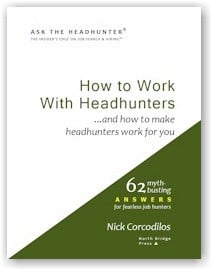We often discuss the Top 10 Stupid Interview Questions that employers ask. This week we’ll talk about two really insulting questions that interviewers should never ask — and how you might respond. One question was posed by a headhunter, and the other by an employer.
In the January 13, 2015 Ask The Headhunter Newsletter, two job seekers’ personal space is invaded by presumptuous interviewers:
Question #1
I am aggressively searching for an IT Technician position, and I have been contacted by several headhunter companies. They usually ask, “What other positions have you applied for?” and, “Which companies have you spoken to?” This makes me uncomfortable. What is the best way to answer?
Nick’s Reply
The best answer is short and sweet: “Sorry, I don’t disclose that information.”
 Be polite, but be firm. It’s none of their business. More important, sharing that information puts you at risk. Unscrupulous headhunters (and there are lots of them) will go straight to the employer you mention and pitch other candidates to compete with you. In the meantime, the headhunter may not schedule any interviews for you at all. He’s used you.
Be polite, but be firm. It’s none of their business. More important, sharing that information puts you at risk. Unscrupulous headhunters (and there are lots of them) will go straight to the employer you mention and pitch other candidates to compete with you. In the meantime, the headhunter may not schedule any interviews for you at all. He’s used you.
In How to Work with Headhunters… and how to make headhunters work for you, I discuss this problem in more detail. The headhunter will likely try to explain that he needs to know where else you’re interviewing because he doesn’t want to create a conflict by submitting you to the same company. Yah, sure.
From HTWWH pp. 85-86, “Should I tell a headhunter who else I’m interviewing with?”:
The argument that the headhunter “just needs to know” to ensure you’re not already interviewing with her client is hogwash. She can just as easily determine that by divulging who her client is. After all, the headhunter called you, not the other way around. A good headhunter should not be bothered because you decline to divulge what companies you’re talking with.
Don’t fall for this ruse.
If they don’t respect your not wanting to disclose, then they’re not worth working with. They lack integrity.
If the headhunter presses you, try this: “Can you please tell me the names of employers and hiring managers you sent candidates to interview with this month?” Of course, it’s none of your business. And where you’re applying for jobs is not his, either.
Question #2
I have been on many job interviews in the last two months and each time they have asked me if I would be loyal to them as my employer. I have been laid off a couple of times, though it had nothing to do with the quality of my work or my loyalty. It was due to a downsizing and a change in the job, requiring new skills I didn’t have. But employers seem to hold me responsible for those short jobs. Is there a nice way to say that I have been loyal, but employers were not loyal to me? I find it interesting and a little suspect when this question comes up in an interview. Do they expect an interviewee to tell them if they were not planning to stay more than a year or so? Why would they ask this? It seems like an unrealistic question.
Nick’s Reply
I think employers ask that question, best case, because they’re naive. At worst, because they’re stupid. If they seem puzzled when you explain it wasn’t you, but the employer, that made the choice to downsize, then that should tell you all you need to know. Their reaction is a non sequitur.
Telling them the truth and committing to the new job is the best you can do. But my cynical answer to these clods would be a question: “Well, how long do you keep your employees?” Of course, they’d be insulted, but turnabout is fair play.
Don’t over-think this. Often, the reason employers question an applicant’s loyalty is because they’ve already got a turnover problem. Rather than root out the real cause, they want you to promise you’ll stick around. Duh.
Another, more interesting, way to handle this is to go on a polite, professional offensive. Before they get to that question, ask them what the turnover rate is in the department you’re interviewing with. By taking the initiative, you also gain the advantage. If they answer honestly, they’ll become defensive. Then you can ask why people keep leaving. By the time they get to questions of your loyalty, their own “bad” is out of the bag.
Be careful, of course. I’m not suggesting being sarcastic. But it’s legit to ask an employer about employee turnover, don’t you think?
(For a head-on approach to changing the path of your job interviews completely, see Fearless Job Hunting, Book 6, The Interview: Be The Profitable Hire, especially pp. 16-18, “How do I overcome my deficiencies?”)
The two questions employers posed in these two Q&As are insulting because they are presumptuous and invasive. No one can assure an employer they will stay at a job, and a job seeker’s other prospects are none of a headhunter’s business. The best way to deal with such questions is to politely but firmly decline to answer them. How snarky you get is up to you.
What really insulting interview questions have you encountered? What’s your advice about the questions in this week’s Q&As?
: :






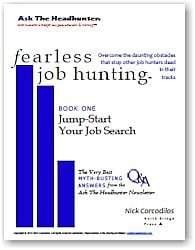
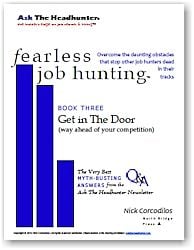
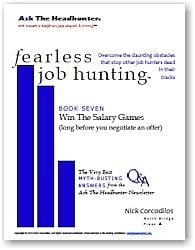
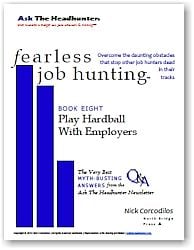




 d at the reviews in Glassdoor prior to the interview and, though there were negative reviews, there were overwhelmingly positive ones as well. I was concerned about the negative reviews, so I brought it up in my interview. The recruiter stated that the office prided itself on being different from its corporate parent, and he felt I was a good fit. So I took the job.
d at the reviews in Glassdoor prior to the interview and, though there were negative reviews, there were overwhelmingly positive ones as well. I was concerned about the negative reviews, so I brought it up in my interview. The recruiter stated that the office prided itself on being different from its corporate parent, and he felt I was a good fit. So I took the job.
 I just read your expose on CareerBuilder (
I just read your expose on CareerBuilder (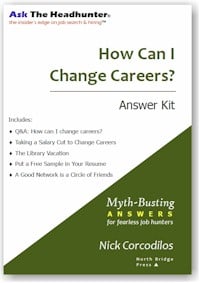 Networking is not about using people. It’s about hanging out with the people you want to work with, where they hang out — talking shop, contributing to your professional community and making friends. The
Networking is not about using people. It’s about hanging out with the people you want to work with, where they hang out — talking shop, contributing to your professional community and making friends. The 